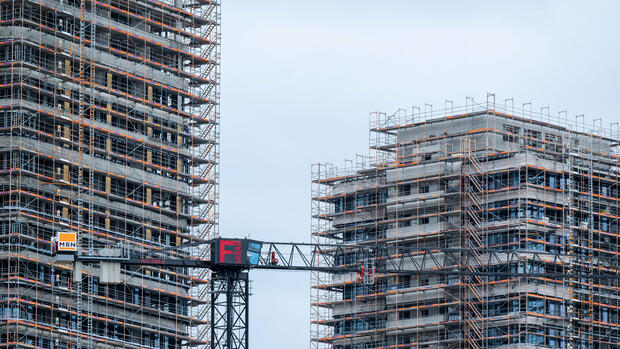Berlin The construction and housing industry warn that the government’s goal of creating 400,000 new homes annually will remain unattainable for years to come. The central association of the housing industry, GdW, expects the number of housing constructions to continue to decrease, with the number of new apartments being completed down to just 200,000 each year. “Under the current political and economic conditions, the socially oriented housing companies can no longer invest in affordable housing,” said GdW President Axel Gedaschko on Monday in Berlin.
The number of completed apartments is already a long way from the federal government’s target. The housing industry expects 242,000 completed apartments for 2023 and only 214,000 apartments in 2024. Last year, 295,300 apartments were completed.
“Enormously increased construction prices, worsening of the conditions and cuts in subsidy programs as well as the rapidly rising interest rates are taking their toll,” said Gedaschko. Investments by the companies organized in the GdW and its regional associations in new residential construction fell by 8.5 percent to nine billion euros in 2022.
At the GdW companies, a good 32,000 apartments were completed in 2022, an increase of twelve percent – which the GdW also sees as a sign of an approaching crash. “Because of the abrupt stop of various funding measures and the severely deteriorated new framework conditions, the companies in the projects under construction and planning have made a final sprint in order to get the projects over the finish line,” explained Gedaschko. The GdW forecast for 2023: falling completion figures by almost a quarter.
The situation is critical. “Companies are postponing planned construction projects or, given the market environment, can no longer implement them and have to cancel them – even if they have already been approved,” said Gedaschko.
Net cold rent of 18 euros per square meter would be economical
The GdW relies on model calculations based on data from the Working Group for Contemporary Building (ARGE). These show that in tight housing markets, the total cost of building an apartment will have increased by 38 percent between mid-2021 and the end of 2023. In more relaxed housing markets, the cost increase is only slightly lower at 29 percent, mainly due to the lower property costs.
>> Read also: How the state makes housing construction more difficult with conditions and costs
Gedaschko says: “With the investment funds of 2021, only 73 apartments in tight housing markets and 78 apartments in relaxed housing markets could be built at the end of 2023 instead of 100 apartments.”
According to the GdW, the necessary net cold rent for a newly built apartment should now be a good 18 euros per square meter in order to be economically viable. “Hardly anyone in Germany can afford such new building rents,” said Gedaschko. That is why the construction of rental apartments is stopped.
1973: A good 714,000 apartments were built in the former federal territory alone
History shows that significantly more apartments were built in Germany at times. Since building statistics began in 1950, an average of 405,000 new homes have been built each year. This is shown by a current evaluation of historical data by the Federal Statistical Office on the occasion of its 75th anniversary.
Accordingly, housing construction reached its highest level in 1973 with a good 714,000 completed apartments in the former federal territory. After German reunification, 1995 was the record year with around 602,800 new apartments in the entire German federal territory.
Felix Pakleppa, General Manager of the German Construction Industry Association (ZDB), warned last week of increasing underutilization in companies. According to data from the Federal Statistical Office, a total of 89,900 building permits for apartments were issued from January to April 2023. That was 27.3 percent less than in the same period last year.
“This slide is also reflected in the order books of contractors,” said Pakleppa. The companies have successfully built up employment in recent years. “Now the increasing underutilization is making it more and more difficult for them to maintain the level of employment.” If the specialists were permanently lost, the housing construction target of 400,000 apartments per year would remain “unattainable for years to come”.
>> Read here: Commission: Expropriation of real estate groups in Berlin possible
Construction companies are also confronted with a multitude of regulations and bureaucratic hurdles. This is also observed by Thomas Reimann, President of the Hesse Construction Industry Association. “These lead to delays, higher costs and ultimately to an aggravation of the housing shortage,” says the entrepreneur. Deregulation is urgently needed.
Building regulations are an important aspect. “Each federal state has its own,” says Reimann. For construction companies that carry out orders in different federal states, this means a considerable amount of additional work. “But why does fire protection in Thuringia have to be designed differently than in Hesse?”
More: The location for buyers and renters in the capital
